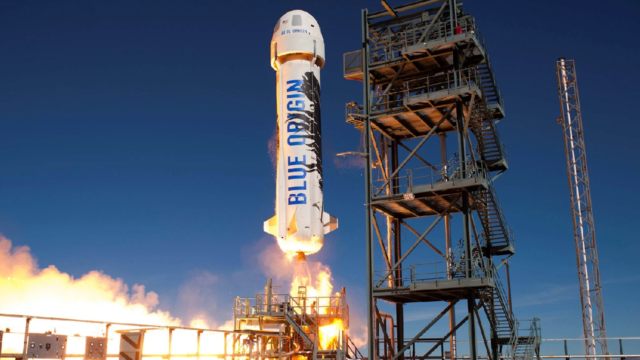In a significant milestone for private spaceflight, Blue Origin’s New Glenn rocket successfully reached orbit on its inaugural flight early Thursday morning. The 320-foot-tall rocket, named after astronaut John Glenn, lifted off from Cape Canaveral Space Force Station at approximately 2 a.m. ET.
The mission’s primary objective was to deploy a prototype satellite into orbit, a goal the company achieved. However, the first-stage booster, designed for reusability, failed to land on a barge in the Atlantic Ocean as planned. Telemetry data from the booster was lost minutes after liftoff, and Blue Origin later confirmed the loss of the booster.
Primary mission was to reach orbit successfully
Jeff Bezos, founder of Blue Origin, observed the launch from the company’s mission control room. He emphasized that while the booster recovery was desirable, the primary mission was to reach orbit successfully. “We hit our key, critical, number-one objective, we got to orbit safely,” said Blue Origin VP Ariane Cornell during the live stream.
This successful launch positions Blue Origin as a formidable competitor in the commercial space industry, particularly in satellite deployment services. The New Glenn rocket boasts a payload capacity comparable to SpaceX’s Falcon Heavy, enabling it to carry substantial cargo into space. Notably, the rocket is slated to support Amazon’s Project Kuiper, an initiative aiming to deploy a constellation of satellites to provide global broadband internet service, directly competing with SpaceX’s Starlink.
The development of New Glenn has spanned over a decade, with significant financial investment from Bezos. The rocket’s reusable design aligns with the industry’s shift towards cost-effective and sustainable space travel. Despite the setback with the booster landing, the mission’s success in reaching orbit marks a pivotal achievement for Blue Origin.
Multiple New Glenn launches on the way
Looking ahead, Blue Origin plans to conduct multiple New Glenn launches this year, with the next mission anticipated in the spring. The company aims to refine its booster recovery process in future flights, enhancing the rocket’s reusability and overall mission efficiency. As the space industry continues to evolve, Blue Origin’s advancements contribute to the increasing accessibility and commercialization of space.
In summary, Blue Origin’s New Glenn rocket has successfully entered Earth’s orbit on its maiden voyage, marking a significant milestone for the company. While the booster landing did not go as planned, the achievement underscores Blue Origin’s growing presence in the competitive landscape of commercial spaceflight.














